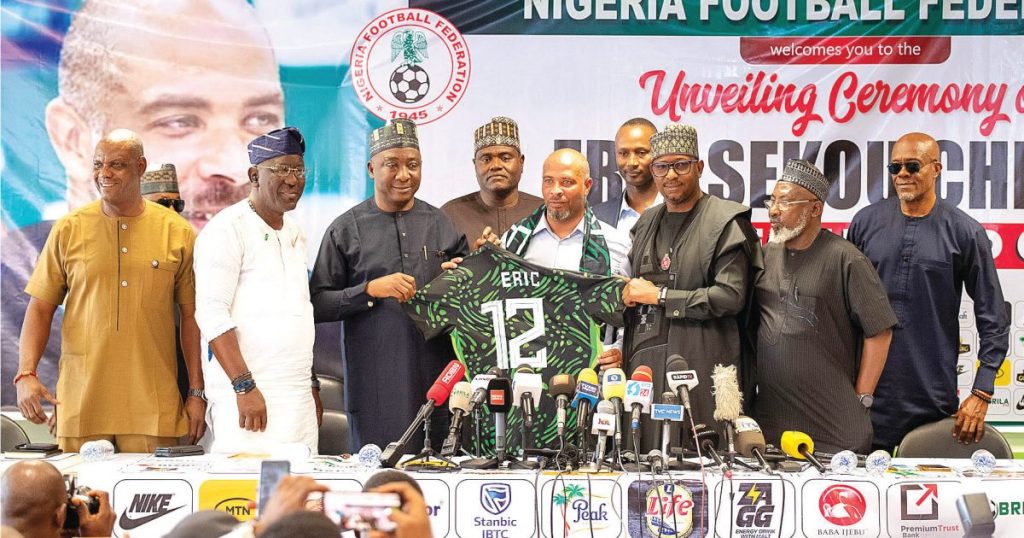The Nigeria Football Federation (NFF) has embarked on a renewed quest for World Cup qualification, placing its faith in the newly appointed Super Eagles coach, Eric Chelle. Chelle, the 37th coach to lead the Nigerian national team, was unveiled at a ceremony in Abuja, marking the beginning of a two-year contract with a potential extension should he successfully steer the team to the 2026 World Cup, co-hosted by the USA, Canada, and Mexico. NFF President Ibrahim Gusau expressed optimism about Chelle’s appointment, emphasizing his understanding of the African football landscape as a crucial factor in achieving this ambitious goal. Gusau drew parallels with past successful coaches, highlighting that their initial track records didn’t necessarily predict their eventual triumphs with the Super Eagles. He assured Chelle of the federation’s unwavering support, echoing the sentiment that a coach who understands the nuances of African football is best positioned to lead the team to success.
Chelle’s immediate task is to revive the Super Eagles’ hopes in the 2026 World Cup qualifiers. Currently positioned fifth in their group with a meager three points from four matches, the team faces a challenging uphill battle. The qualifying campaign resumes in March, with a crucial away fixture against Rwanda followed by a home game against Zimbabwe in Uyo. These matches represent critical opportunities for Chelle to begin implementing his vision for the team and to start accumulating the points necessary to climb the group standings. The pressure is undoubtedly high, but the NFF believes that Chelle possesses the tactical acumen and understanding of African football to navigate these challenges and guide the Super Eagles towards qualification.
Chelle’s footballing journey, though not extensively detailed, reveals a blend of playing and coaching experience. His playing career saw him earn five caps for the Malian national team, known as the Aiglons. His coaching trajectory includes stints with clubs like GS Consolat, FC Martigues, Boulogne, and MC Oran, providing him with a diverse range of experiences across different footballing cultures. Perhaps most significantly, Chelle led the Malian national team to a near-semifinal berth in the 2023 Africa Cup of Nations (AFCON). Their heartbreaking extra-time defeat to eventual champions Ivory Coast, after leading for most of the match, demonstrated Chelle’s ability to strategize and compete against top-tier African opposition.
The NFF’s decision to appoint Chelle is rooted in their belief that his experience within African football is paramount. Gusau’s emphasis on this factor during the unveiling ceremony underscores the federation’s conviction that understanding the specific challenges and opportunities within African football is key to unlocking the Super Eagles’ potential. This understanding encompasses not only tactical approaches but also the cultural nuances, player mentalities, and the unique competitive landscape of African football. The NFF believes that Chelle’s familiarity with these aspects will enable him to build a cohesive and effective team capable of competing at the highest level.
The road to the 2026 World Cup is undeniably arduous for the Super Eagles. Their current position in the qualifying group necessitates a significant turnaround in form and a consistent string of positive results. However, the NFF’s confidence in Chelle, coupled with their commitment to providing him with the necessary support, offers a glimmer of hope. Chelle’s task is not merely to qualify for the World Cup but also to revitalize the Super Eagles, instilling a renewed sense of purpose and a winning mentality. The coming months will be a crucial test of his abilities and a defining period for the future of Nigerian football.
The NFF’s strategy hinges on the belief that a coach intimately familiar with the complexities of African football can best navigate the challenges and maximize the potential of the Super Eagles. They see in Chelle a coach who understands the tactical nuances, the player mentalities, and the unique competitive landscape of the African game. This strategic approach represents a calculated gamble, but one that the NFF believes is essential to achieving their ultimate goal of World Cup qualification. The success or failure of this gamble will not only determine the fate of the Super Eagles in the 2026 World Cup but will also serve as a testament to the NFF’s faith in the power of understanding African football.


